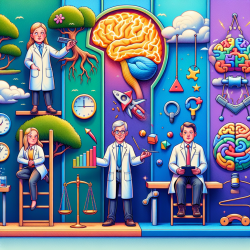The transition from childhood to adolescence is a critical period marked by significant cognitive and behavioral changes. The recent study titled "The Structure of Cognitive Abilities and Associations with Problem Behaviors in Early Adolescence: An Analysis of Baseline Data from the Adolescent Brain Cognitive Development Study" offers valuable insights into this developmental phase. For practitioners working with adolescents, understanding these findings can enhance their ability to address problem behaviors effectively.
The Three-Factor Model of Cognitive Abilities
The study utilized data from the Adolescent Brain Cognitive Development (ABCD) Study to explore the structure of cognitive abilities in children aged 9 to 10 years. Through exploratory factor analysis (EFA) and confirmatory factor analysis (CFA), researchers identified a three-factor model comprising:
- Verbal Ability (VA): This factor includes tasks related to language skills, such as vocabulary and reading comprehension.
- Executive Function/Processing Speed (EF/PS): Tasks under this factor involve attention, inhibitory control, and cognitive flexibility.
- Working Memory/Episodic Memory (WM/EM): This factor covers tasks related to memory retention and recall.
The identification of these factors provides a clearer understanding of how different cognitive abilities are structured during early adolescence. Practitioners can use this knowledge to tailor interventions that target specific cognitive domains associated with problem behaviors.
Associations with Problem Behaviors
The study also examined the relationship between these cognitive abilities and problem behaviors using the Child Behavior Checklist (CBCL). The findings revealed significant associations between the three cognitive factors and various behavioral outcomes:
- Internalizing Behaviors: These include anxiety, depression, and withdrawal. The study found that verbal ability was positively associated with internalizing behaviors, although the effect size was small.
- Externalizing Behaviors: These encompass aggression, hyperactivity, and rule-breaking. Both EF/PS and WM/EM were negatively associated with externalizing behaviors, suggesting that deficits in these areas may contribute to such problems.
- Stress-Related Problems: Similar to externalizing behaviors, lower scores in EF/PS and WM/EM were linked to higher stress-related issues.
The implications for practitioners are clear: interventions aimed at enhancing executive function and working memory could potentially mitigate problem behaviors in adolescents. By focusing on strengthening these cognitive domains, practitioners can help students develop better self-regulation skills, ultimately improving their behavioral outcomes.
Encouraging Further Research
This study serves as a foundation for further research into the complex relationships between cognitive abilities and problem behaviors. Practitioners are encouraged to stay informed about ongoing research in this area to continually refine their approaches. Engaging with current studies not only enhances professional knowledge but also contributes to more effective interventions tailored to individual student needs.
Practical Applications for Practitioners
Incorporating findings from this study into practice involves several steps:
- Assessment: Use tools that measure verbal ability, executive function, and working memory to identify areas where students may need support.
- Intervention Design: Develop targeted interventions that focus on improving specific cognitive skills associated with problem behaviors.
- Collaboration: Work closely with other educators, parents, and mental health professionals to create a comprehensive support system for students.
- Continuous Learning: Stay updated on new research findings through conferences, webinars, and publications to ensure interventions are based on the latest evidence.
The insights gained from the ABCD Study offer a valuable framework for understanding adolescent development. By leveraging this knowledge, practitioners can enhance their skills and make a meaningful impact on the lives of young individuals facing cognitive and behavioral challenges.
To read the original research paper, please follow this link: The Structure of Cognitive Abilities and Associations with Problem Behaviors in Early Adolescence: An Analysis of Baseline Data from the Adolescent Brain Cognitive Development Study.










